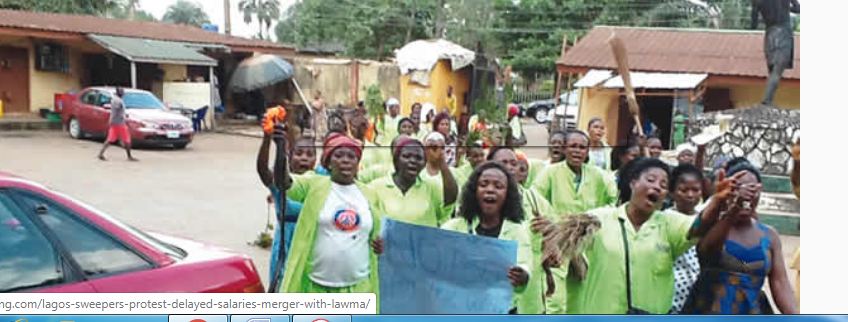News
Lagos sweepers protest delayed salaries, merger with LAWMATA

Scores of street sweepers under the “Cleaner Lagos Initiative” of the Lagos State Government on Wednesday protested their delayed salaries and merger with the Lagos State Waste Management Authority.
The protesters, who were chanting various solidarity songs at the Alausa Secretariat, barricaded the road and urged Governor Akinwunmi Ambode to intervene.
One of the aggrieved workers, Mrs Kehinde Egbetola, said that it was unfortunate that the salaries being given to the workers was always delayed for close to one month before payment
“We don’t have tools to work with; our colleagues are dying; we don’t have health insurance, pensions and so many other things that could have been of benefit to us.
“We are not illiterates, some of us are graduates.
“We are paid salaries after 20 days of the following month. So, when the month ends, we will start begging people for money.
“I took this job because of unemployment to keep body and soul together but the suffering is too much,” he lamented.
“Also, we don’t want to be merged with LAWMA because LAWMA is fond of enslaving workers. We were employed by the state government under the Cleaner Lagos Initiative.
“We are appealing to the government to regularise our appointment.
“At least, we are government workers, we should be given our Oracle numbers and ID cards to show that we are members of staff of the government,” he said.
Mrs Bose Osinowo, another protester, claimed that several workers had been killed by vehicles while working on the roadside.
Osinowo said: “Please, tell the government that we don’t want LAWMA. We were told to drop our green overall uniform for the pink uniform of LAWMA before we will be paid.
“We don’t want to work on Sundays, we also want to observe all public holidays. We want to be staffed.
“We want our money increased from N18, 500 rather than the proposed reduction to N12,000 by LAWMA.’’
Another, Mrs Kudirat Agboola, told NAN that the initial intention of the workers was to protest the death of one of the staff who was killed last month by a hit-and-run driver.
“We want the government to take care of the six children the deceased left behind. We don’t want LAWMA,’’ Agboola said.
Mrs Oluwatobiloba Olatunji alleged that LAWMA was planning to reduce their salaries from N18,500 to N12,000.
She also claimed that LAWMA had the habit of deducting their salaries anytime anyone was absent from work even for genuine reasons.
“We prefer our working conditions under Visionscape. We have really been suffering since LAWMA inherited us; unlike what used to happen in the past,’’ she said.
The protesters unanimously demanded for an increase rather than reduction in salaries and revealed that LAWMA had concluded plans to reduce the number of workers employed under the scheme.
NAN reports that the protesters were not allowed into the governor’s office premises and they were not addressed by any government official before they left.
